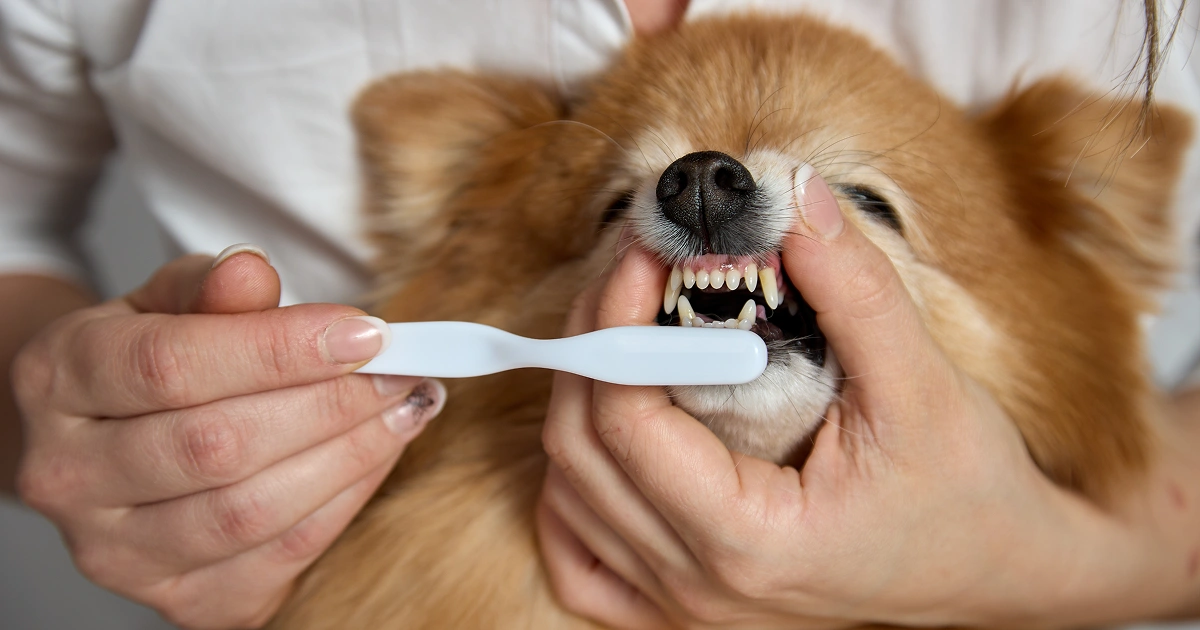
Your dog’s teeth play a vital role in their overall health and well-being. If they are experiencing pain, decay, periodontal disease, or other issues, it can affect their ability to eat and increase risk of infection, heart disease, and more. Keeping your dog’s teeth clean and healthy is an ongoing responsibility and something you can work on daily.
1. Periodically inspect your dog’s mouth.
Slowly work with your dog to get them comfortable with you touching their face and mouth. Carefully lift their lips to look at their teeth and gums. Check for any teeth that might be cracked, broken, missing, or have tartar buildup. Make sure their gums are moist and pink and there are no areas that are red, inflamed, or bleeding. If you do notice anything concerning or out of the ordinary, contact your veterinarian for a professional examination.
2. Brush your dog’s teeth.
Just like humans, dogs benefit from having their teeth brushed too. While you don’t have to tackle this task daily, a few days a week is a good rule of thumb. Let your dog get used to the toothpaste and brush before you start by letting them smell and lick them. Use a toothbrush or finger brush and toothpaste specially designed for dogs, and don’t worry if your pet isn’t a fan at first.
Brush just a few teeth at a time and work your way up to their full mouth. It’s okay if they don’t open their mouth – if you can slip the brush in between their lips and brush along their gumline, that can make a positive impact on their oral health. Choose a time to brush your dog’s teeth when they are tired or relaxed, so they are less likely to resist.
3. Don’t ignore bad breath.
While it is unrealistic to expect your dog’s breath to smell fresh and clean, the smell shouldn’t be overwhelming or intolerable. Exceptionally bad breath can be a sign of dental problems such as infection, periodontal disease, or tooth decay. Talk to your veterinarian about breath treats or chews that can help control odor and support oral health.
4. Let your dog chew on appropriate toys.
Chewing is good for your dog’s teeth, and you can find toys or treats that help to scrape away tartar buildup as your dog bites down on them. This can help keep their teeth cleaner and their breath fresher. Be cautious about anything that is too hard and may damage your dog’s teeth, or anything that could splinter apart such as certain bones or rawhide.
5. Watch their diet.
Make sure your dog is eating nutritious food and not a lot of treats or table scraps. If you want to give them a treat, opt for crunchy fresh fruits and vegetables such as apple slices, carrots, or broccoli. Not only do they provide vitamins and minerals, but they can also help scrape away plaque and strengthen teeth and muscles as they chew. Select a dog food that has the right balance of nutrients for your pet’s breed, age, and dietary needs. Provide plenty of clean water as well to keep your dog hydrated and help wash away loose food as they drink.
6. Schedule a professional cleaning.
If you feel uncomfortable trying to examine or brush your dog’s teeth, they are not cooperative, you are concerned about their oral health, or you simply want to protect their teeth and gums, schedule a professional dental cleaning. The veterinarian can check for potential issues, treat any problems they may find, and give their teeth a thorough cleaning. They can also provide recommendations for other things you can do at home to support their oral health and various chew toys or treats to try.
Another way you can help keep your dog healthy and feeling their best is with regular grooming appointments. Get your dog bathed, trimmed, and styled during their next stay at Lake Wylie Pet Resort. Schedule an appointment today or coordinate it with the next time they are boarded.




